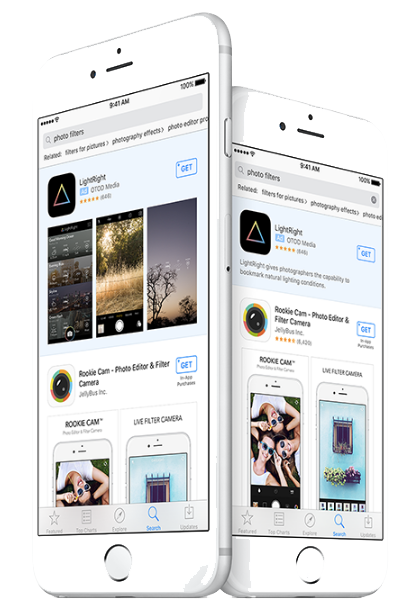 Programmatic wasn’t to Apple’s taste, but advertising isn’t so bad if you’re the one driving the bus.
Programmatic wasn’t to Apple’s taste, but advertising isn’t so bad if you’re the one driving the bus.
After killing off iAd in January, Apple on Wednesday shared its plans, notably in advance of its upcoming Worldwide Developers Conference, to completely change the way its App Store operates – namely with the introduction of paid search ads, which will be rolling out in beta this summer. Apple also announced speedier app approval times, a new subscription model and a revenue split that will reward developers for retaining loyal users.
“It does seem like this could signal a more open approach to communicating with the developer community, and it shows that they’re actively reaching out,” said Michael Oiknine, CEO of Apsalar. “But at the same time, it’s also a charm offensive to mask the fact that developers are now going to pay for search.”
Developers will be able to compete in auctions à la Google AdWords for a single paid slot at the top of an App Store search.
The install ads will be clearly labeled as such and not shown to users under 13 when possible. Developers will get back info about clicks (well, taps), but, consistent with Apple’s strenuously stated stance on privacy, they won’t get access to any user data.
“It’s limiting to a certain degree for a marketer,” said Jason Hartley, VP and search practice lead at 360i. “Beyond age, gender and where you live, I’d love to know what brands you’re interested in, if you’re a runner or a swimmer. But I also understand why Apple is not comfortable sharing that information.”
Although TUNE CEO Peter Hamilton called the intro of paid search in the App Store “a natural move” and “a no-brainer,” Oiknine called the whole thing a bit … “weird.” Weird, but understandable.
“When Apple got out of iAd, everyone was saying that’s because Apple doesn’t want to be a media company,” Oiknine said. “But now they’re being pulled back into it like gravity. You have to wonder why they’re doing it.”
The answers to that depend on how cynical you are.
From one perspective, it’s about helping app developers get discovered and monetize, increasingly difficult tasks in an App Store populated by more than 1.5 million offerings.
“The search business is a great direction for Apple because it keeps everything first-party and allows them to maintain their strong privacy position while at the same time providing something with real volume and scale to get apps discovered,” Hamilton said. “And to do that, Apple will also have to bring more transparency to the store to help marketers determine the value of different campaigns and keywords.”
But it’s also clearly about the bottom line, Oiknine said. The iPhone market is nearly saturated, Apple TV arguably hasn’t taken off yet and Apple Watch might be gaining some traction in the luxury market, but it’s hardly a revenue-driver on the scale of the iPhone.
Search, though, is a license to print money. AdWords, also available in the Play Store, is a gold mine for Google.
“I think Apple made its calculation and they realized they were leaving money on the table,” Oiknine said.
If Apple’s algorithm is nuanced enough to balance both advertiser and user needs – in essence, giving both parties what they want through a blend of getting what you pay for and utility – there’s no reason it won’t be raking in money hand over fist.
But introducing a paid model means that Apple is going to have to adopt a far more open approach. Apple could get away with keeping its organic search in a black box before, a mixture of metadata and curation, but that won’t fly anymore.
 “If I’m paying money for a placement, I want that placement,” Oiknine said.
“If I’m paying money for a placement, I want that placement,” Oiknine said.
Although Apple has said ads will only show up if they’re relevant to the search query, developers with deep pockets, the ones that already sit atop the charts, are most likely to win. There’s also the possibility that junky apps will be able to buy themselves more visibility.
“Organic results are better for users because, theoretically, the best apps appear there based on app review, number of users, etc.,” said Wally Nguyen, CEO of mNectar. “Paid search is simply about who can pay the top dollar – which will be the same developers who are already in the top 10, 20, 30 and 100 of the App Store anyway.”
The little guy might get left out in the cold, but that could also represent a natural culling of the herd.
“Clearly, smaller developers might feel like they’re being priced out, but there will better discoverability,” said 360i’s Hartley. “Apple has satisfied my concerns that this won’t impact the integrity of their search.”
Paid search might even help the underdog unseat the incumbents, at least some of the time, said Dean Murphy, the indie developer behind the Crystal ad-blocking app.
“A great app with a small budget could use this tool to get some great exposure, too,” said Murphy, who’s planning to try out Apple’s search ads for Crystal as soon as he gets access to the beta.
Even so, “I would hate for this to be a situation where the most popular keywords are sat on by those with the biggest marketing budgets,” he said.
Ultimately, though, App Store discovery probably won’t end up being an and/or sort of thing, and cream will (one can always hope) rise to the top.
“Just as traditional search is some blend of organic and paid, that will likely be the right mix here – it’s just up to us to find out what the right mix is,” Hartley said. “App Store optimization is still a really nascent skill. We’re all still figuring it out together.”













